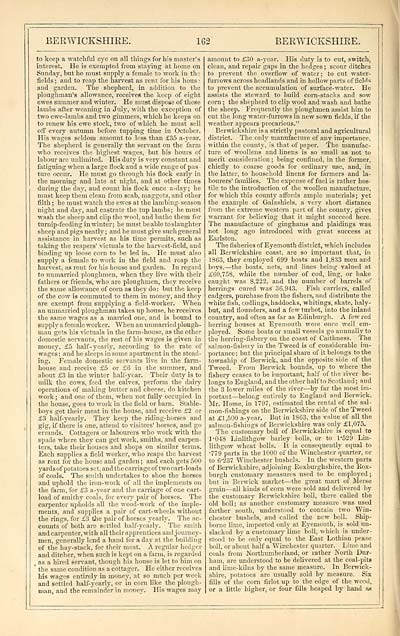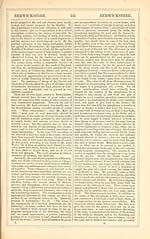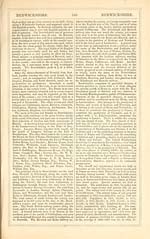Imperial gazeteer of Scotland, or, Dictionary of Scottish topography > Volume 1
(260) Page 162 - BER
Download files
Complete book:
Individual page:
Thumbnail gallery: Grid view | List view

BERWICKSHIRE.
162
BERWICKSHIRE.
to keep a watchful eye on all things for his master's
interest. He is exempted from staying at home on
Sunday, but he must supply a female to work in tha
fields ; and to reap the harvest as rent for his hous !
and garden. The shepherd, in addition to the
ploughman's allowance, receives the keep of eight
ewes summer and winter. He must dispose of these
lambs after weaning in July, with the exception of
two ewe-lambs and two gimmers, which he keeps on
to renew his ewe stock, two of which he must sell
off eveiy autumn before tupping time in October.
His wages seldom amount to less than £35 a-year.
The shepherd is generally the servant on the farm
who receives the highest wages, but his hours of
labour are unlimited. His duty is very constant and
fatiguing when a large flock and a wide range of pas
ture occur. He must go through his flock early in
the morning and late at night, and at other times
during the day, and count his flock once a-day; he
must keep them clean from scab, maggots, and other
filth ; he must watch the ewes at the lambing- season
night and day, and castrate the tup lambs ; he must
wash the sheep and clip the wool, and bathe them for
turnip-feeding in winter ; he must be able to slaughter
sheep and pigs neatly ; and he must give such general
assistance in harvest as his time permits, such as
taking the reapers' victuals to the harvest-field, and
binding up loose corn to be led in. He must also
supply a female to work in the field and reap the
harvest, as rent for his house and garden. In regard
to unmarried ploughmen, when they live with their
fathers or friends, who are ploughmen, they receive
the same allowance of com as they do : but the keep
of the cow is commuted to them in money, and they
are exempt from supplying a field-worker. When
an unmarried ploughman takes up house, he receives
the same wages as a married one, and is bound to
supply a female worker. When an unmarried plough-
man gets his victuals in the farm-house, as the other
domestic servants, the rest of his wages is given in
money, £5 half-yearly, according to the rate of
wages ; and he sleeps in some apartment in the stead-
ing. Female domestic servants live in the farm-
house and receive £5 or £6 in the summer, and
about £3 in the winter half-year. Their duty is to
milk the cows, feed the calves, perform the dairy
operations of making butter and cheese, do kitchen
work ; and one of them, when not fully occupied in
the house, goes to work in the field or barn. Stable-
boys get their meat in the house, and receive £2 or
£3 half-yearly. They keep the riding-horses and
gig, if there is one, attend to visitors' horses, and go
errands. Cottagers or labourers who work with the
spade where they can get work, smiths, and carpen-
ters, take their houses and shops on similar terms.
Each supplies a field worker, who reaps the harvest
as rent for the house and garden ; and each gets 500
yards of potatoes set, and the carriage of two cart-loads
of coals. The smith undertakes to shoe the horses
and uphold the iron-work of all the implements on
the farm, for £3 a-year and the carnage of one cart-
load of smithy coals, for every pair of horses. The
carpenter upholds all the wood-work of the imple-
ments, and supplies a pair of cart-wheels without
the rings, for £3 the pair of horses yearly. The ac-
counts of both are settled half-yearly. The smith
and carpenter, with all their apprentices and journey-
men, generally lend a hand for a day at the building
of the hay-stack, for their meat. A regular hedger
and ditcher, when such is kept on a farm, is regarded
, as a hired servant, though his house is let to him on
' the same condition as a cottager. He either receives
his wages entirely in money, at so much per week
and settled half-yearly, or in corn like the plough-
man, and the remainder in money. His wages may
amount to £30 a-year. His duty is to cut, switch,
clean, and repair gaps in the hedges ; scour ditches
to prevent the overflow of water; to cut water-
furrows across headlands and in hollowparts of fields
to prevent the accumulation of surface-water. He
assists the steward to build corn-stacks and sow
corn ; the shepherd to clip wool and wash and bathe
the sheep. Frequently the ploughmen assist him to
cut the long water-furrows in new sown fields, if the
weather appears precarious."
Berwickshire is a strictly pastoral and agricultural
district. The only manufacture of any importance,
within the county, is that of paper. The manufac-
ture of woollens and linens is so small as not to
merit consideration ; being confined, in the former,
chiefly to coarse goods for ordinary use, and, in
the latter, to household linens for farmers and la-
bourers' families. The expense of fuel is rather hos-
tile to the introduction of the woollen manufacture,
for which this county affords ample materials ; yet
the example of Galashiels, a very short distance
from the extreme western part of the county, gives
warrant for believing that it might succeed here.
The manufacture of ginghams and plaidings was
not long ago introduced with great success at
Earlston.
The fisheries of Eyemouth district, which includes
all Berwickshire coast, are so important that, in
1863, they employed 699 boats and 1,833 men and
boys, — the boats, nets, and lines being valued at
£60,758, while the number of cod, ling, or hake
caught was 8,222, and the number of barrels of
herrings cured was 36,943. Fish carriers, called
cadgers, purchase from the fishers, and distribute the
white fish, codlings, haddocks, whitings, skate, haly-
but, and flounders, and a fewturbot, into the inland
country, and often as far as Edinburgh. A few red
herring houses at Eyemouth were once well em-
ployed. Some boats or small vessels go annually to
the'herring-fishery on the coast of Caithness. The
salmon-fishery in the Tweed is of considerable im-
portance: but the principal share of it belongs to the
township of Berwick, and the opposite side of the
Tweed. From Berwick bounds, up to where the
fishery ceases to be important, half of the river be-
longs to England, and the other half to Scotland ; and
the 3 lower miles of the river — by far the most im-
portant—belong entirely to England and Berwick.
Mr. Home, in 1797, estimated the rental of the sal-
mon-fishings on the Berwickshire side of the Tweed
at £1,500 a-year. But in 1863, the value of all the
salmou-fishings of Berwickshire was only £1,075.
The customary boll of Berwickshire is equal to
1-048 Linlithgow barley bolls, or to 1-529 Lin-
lithgow wheat bolls. It is consequently equal to
•779 parts in the 1000 of the Winchester quarter, or
to 6*237 Winchester bushels. In the western parts
of Berwickshire, adjoining Roxburghshire, the Box-
burgh customary measures used to be employed ;
but in Berwick market — the great mart of Merse
grain — all kinds of com were sold and delivered by
the customary Berwickshire boll, there called the
old boll; as another customary measure was used
farther south, understood to contain two Win-
chester bushels, and called the new boll. Ship-
borne lime, imported only at Eyemouth, is sold un-
slacked by a customary lime boll, which is under-
stood to be only equal to the East Lothian pease
boll, or about half a Winchester quarter. Lime and
coals from Northumberland, or rather North Dur-
ham, are understood to be delivered at the coal-pits
and lime-kilns by the same measure. In Berwick-
shire, potatoes are usually sold by measure. Six
fills of the corn firlot up to the edge of the wood,
or a little higher, or four fills heaped by hand as
162
BERWICKSHIRE.
to keep a watchful eye on all things for his master's
interest. He is exempted from staying at home on
Sunday, but he must supply a female to work in tha
fields ; and to reap the harvest as rent for his hous !
and garden. The shepherd, in addition to the
ploughman's allowance, receives the keep of eight
ewes summer and winter. He must dispose of these
lambs after weaning in July, with the exception of
two ewe-lambs and two gimmers, which he keeps on
to renew his ewe stock, two of which he must sell
off eveiy autumn before tupping time in October.
His wages seldom amount to less than £35 a-year.
The shepherd is generally the servant on the farm
who receives the highest wages, but his hours of
labour are unlimited. His duty is very constant and
fatiguing when a large flock and a wide range of pas
ture occur. He must go through his flock early in
the morning and late at night, and at other times
during the day, and count his flock once a-day; he
must keep them clean from scab, maggots, and other
filth ; he must watch the ewes at the lambing- season
night and day, and castrate the tup lambs ; he must
wash the sheep and clip the wool, and bathe them for
turnip-feeding in winter ; he must be able to slaughter
sheep and pigs neatly ; and he must give such general
assistance in harvest as his time permits, such as
taking the reapers' victuals to the harvest-field, and
binding up loose corn to be led in. He must also
supply a female to work in the field and reap the
harvest, as rent for his house and garden. In regard
to unmarried ploughmen, when they live with their
fathers or friends, who are ploughmen, they receive
the same allowance of com as they do : but the keep
of the cow is commuted to them in money, and they
are exempt from supplying a field-worker. When
an unmarried ploughman takes up house, he receives
the same wages as a married one, and is bound to
supply a female worker. When an unmarried plough-
man gets his victuals in the farm-house, as the other
domestic servants, the rest of his wages is given in
money, £5 half-yearly, according to the rate of
wages ; and he sleeps in some apartment in the stead-
ing. Female domestic servants live in the farm-
house and receive £5 or £6 in the summer, and
about £3 in the winter half-year. Their duty is to
milk the cows, feed the calves, perform the dairy
operations of making butter and cheese, do kitchen
work ; and one of them, when not fully occupied in
the house, goes to work in the field or barn. Stable-
boys get their meat in the house, and receive £2 or
£3 half-yearly. They keep the riding-horses and
gig, if there is one, attend to visitors' horses, and go
errands. Cottagers or labourers who work with the
spade where they can get work, smiths, and carpen-
ters, take their houses and shops on similar terms.
Each supplies a field worker, who reaps the harvest
as rent for the house and garden ; and each gets 500
yards of potatoes set, and the carriage of two cart-loads
of coals. The smith undertakes to shoe the horses
and uphold the iron-work of all the implements on
the farm, for £3 a-year and the carnage of one cart-
load of smithy coals, for every pair of horses. The
carpenter upholds all the wood-work of the imple-
ments, and supplies a pair of cart-wheels without
the rings, for £3 the pair of horses yearly. The ac-
counts of both are settled half-yearly. The smith
and carpenter, with all their apprentices and journey-
men, generally lend a hand for a day at the building
of the hay-stack, for their meat. A regular hedger
and ditcher, when such is kept on a farm, is regarded
, as a hired servant, though his house is let to him on
' the same condition as a cottager. He either receives
his wages entirely in money, at so much per week
and settled half-yearly, or in corn like the plough-
man, and the remainder in money. His wages may
amount to £30 a-year. His duty is to cut, switch,
clean, and repair gaps in the hedges ; scour ditches
to prevent the overflow of water; to cut water-
furrows across headlands and in hollowparts of fields
to prevent the accumulation of surface-water. He
assists the steward to build corn-stacks and sow
corn ; the shepherd to clip wool and wash and bathe
the sheep. Frequently the ploughmen assist him to
cut the long water-furrows in new sown fields, if the
weather appears precarious."
Berwickshire is a strictly pastoral and agricultural
district. The only manufacture of any importance,
within the county, is that of paper. The manufac-
ture of woollens and linens is so small as not to
merit consideration ; being confined, in the former,
chiefly to coarse goods for ordinary use, and, in
the latter, to household linens for farmers and la-
bourers' families. The expense of fuel is rather hos-
tile to the introduction of the woollen manufacture,
for which this county affords ample materials ; yet
the example of Galashiels, a very short distance
from the extreme western part of the county, gives
warrant for believing that it might succeed here.
The manufacture of ginghams and plaidings was
not long ago introduced with great success at
Earlston.
The fisheries of Eyemouth district, which includes
all Berwickshire coast, are so important that, in
1863, they employed 699 boats and 1,833 men and
boys, — the boats, nets, and lines being valued at
£60,758, while the number of cod, ling, or hake
caught was 8,222, and the number of barrels of
herrings cured was 36,943. Fish carriers, called
cadgers, purchase from the fishers, and distribute the
white fish, codlings, haddocks, whitings, skate, haly-
but, and flounders, and a fewturbot, into the inland
country, and often as far as Edinburgh. A few red
herring houses at Eyemouth were once well em-
ployed. Some boats or small vessels go annually to
the'herring-fishery on the coast of Caithness. The
salmon-fishery in the Tweed is of considerable im-
portance: but the principal share of it belongs to the
township of Berwick, and the opposite side of the
Tweed. From Berwick bounds, up to where the
fishery ceases to be important, half of the river be-
longs to England, and the other half to Scotland ; and
the 3 lower miles of the river — by far the most im-
portant—belong entirely to England and Berwick.
Mr. Home, in 1797, estimated the rental of the sal-
mon-fishings on the Berwickshire side of the Tweed
at £1,500 a-year. But in 1863, the value of all the
salmou-fishings of Berwickshire was only £1,075.
The customary boll of Berwickshire is equal to
1-048 Linlithgow barley bolls, or to 1-529 Lin-
lithgow wheat bolls. It is consequently equal to
•779 parts in the 1000 of the Winchester quarter, or
to 6*237 Winchester bushels. In the western parts
of Berwickshire, adjoining Roxburghshire, the Box-
burgh customary measures used to be employed ;
but in Berwick market — the great mart of Merse
grain — all kinds of com were sold and delivered by
the customary Berwickshire boll, there called the
old boll; as another customary measure was used
farther south, understood to contain two Win-
chester bushels, and called the new boll. Ship-
borne lime, imported only at Eyemouth, is sold un-
slacked by a customary lime boll, which is under-
stood to be only equal to the East Lothian pease
boll, or about half a Winchester quarter. Lime and
coals from Northumberland, or rather North Dur-
ham, are understood to be delivered at the coal-pits
and lime-kilns by the same measure. In Berwick-
shire, potatoes are usually sold by measure. Six
fills of the corn firlot up to the edge of the wood,
or a little higher, or four fills heaped by hand as
Set display mode to: Large image | Transcription
Images and transcriptions on this page, including medium image downloads, may be used under the Creative Commons Attribution 4.0 International Licence unless otherwise stated. ![]()
| Gazetteers of Scotland, 1803-1901 > Imperial gazeteer of Scotland, or, Dictionary of Scottish topography > Volume 1 > (260) Page 162 - BER |
|---|
| Permanent URL | https://digital.nls.uk/97462250 |
|---|
| Description | Volume I: Aan-Gordon. |
|---|---|
| Attribution and copyright: |
|

